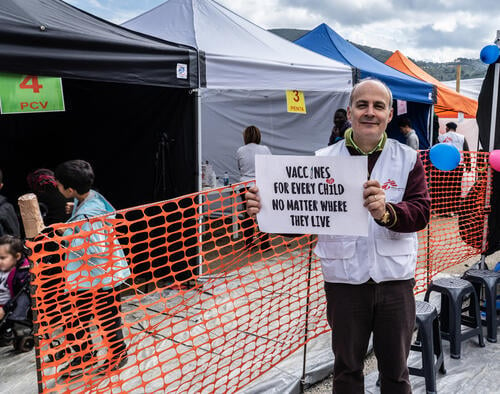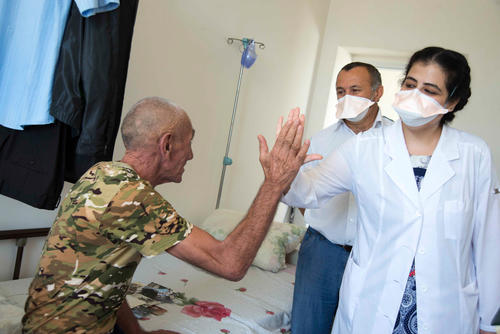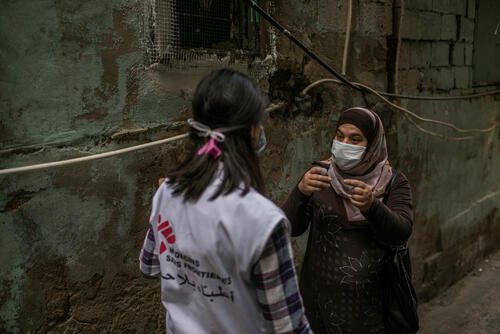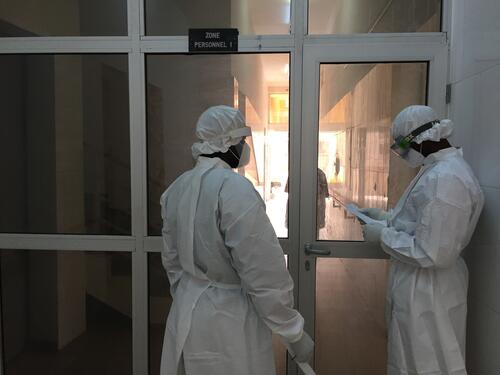- A new vaccine against one of the world’s deadliest childhood diseases – pneumonia – is now available at a more affordable price than existing vaccines.
- Vaccine funding organisation, Gavi, the Vaccine Alliance, has a $1.5 billion funding programme for the pneumonia vaccine, of which 80 per cent has already been paid to two pharma giants.
- MSF urges Gavi – and WHO, UNICEF and the Gates Foundation – to ensure that the remaining amount is spent to ensure access to this third, more affordable, vaccine to protect children.
Geneva — As Gavi, the Vaccine Alliance, starts to commemorate its 20th year and launches a new fundraising appeal, Médecins Sans Frontières (MSF) stressed that more must be done to make sure the 55 million children who do not have access to the pneumonia vaccine are protected against this worst global childhood killer, now that a new, more affordable vaccine is at long last available.
In December 2019, the first alternative pneumonia vaccine product was quality assured by the World Health Organization (WHO), finally providing an alternative to Pfizer and GlaxoSmithKline’s (GSK) versions, which until now have been the only two pneumonia vaccines available worldwide.
The entire vaccination community needs to be moving mountains to make sure every country can start protecting all of its children against pneumonia.Kate Elder, Senior Vaccines Policy Advisor, MSF Access Campaign
The newer vaccine, produced by The Serum Institute of India, is expected to be priced 30 per cent lower than Pfizer and GSK’s lowest global prices, with a substantially more affordable price expected for middle-income countries. These countries make up the vast majority of the 50 countries that have still not started to use the vaccine at all, primarily because of its high price.
“We have been working for the past decade to get affordable access to the pneumonia vaccine for the children we treat and are very encouraged that there is finally another, more affordable version,” said Kate Elder, Senior Vaccines Policy Advisor at MSF’s Access Campaign. “The entire vaccination community needs to be moving mountains to make sure every country can start protecting all of its children against pneumonia, now that there’s finally a vaccine that won’t bankrupt countries’ health budgets long term.”
“Now there’s no excuse – Gavi, the WHO, UNICEF and the Gates Foundation all have a major role to play in making sure every last child is protected against this killer disease,” Elder said.
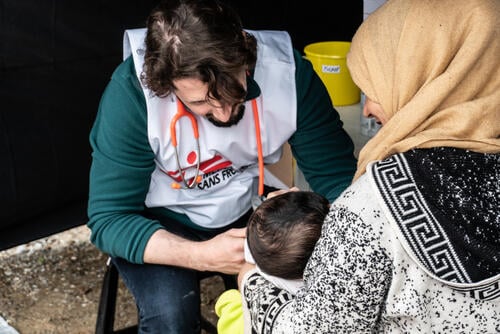
About 10 years ago, Gavi launched a special programme to stimulate development of pneumonia vaccines that meet developing-country needs and to accelerate rollout of this lifesaving vaccine in the world’s poorest countries. This programme (called the Advanced Market Commitment), involved paying a special top-up subsidy to Pfizer and GSK on top of the price they charged for the vaccine.
The two corporations have so far been awarded US$1.2 billion of the $1.5 billion subsidy, and MSF is now urging the remaining $262 million to not be paid out to Pfizer and GSK, but instead be used to introduce the new, more affordable vaccine in countries.
Now it’s time for the global vaccines community… to put all of its weight behind the introduction of this more affordable vaccine so that it benefits babies… in places where babies and kids are still not receiving it.Kate Elder, Senior Vaccines Policy Advisor, MSF Access Campaign
Pfizer and GSK have earned a combined $50 billion globally in sales of the pneumonia vaccine to date and have reduced their price charged to Gavi minimally over the last decade. At the same time, the pneumonia vaccine alone accounts for 44 per cent of what Gavi spends on vaccines; Gavi currently funds the use of 12 different vaccines.
Beyond countries that are eligible to receive support from Gavi are the dozens of middle-income countries that have struggled to introduce the pneumonia vaccine at all. While the lowest global price for the vaccine is $8.70 per child (for the world’s poorest countries), and the newer vaccine is expected to be priced at $6 per child, middle-income countries where MSF works, such as the Philippines and Lebanon have been forced to pay as much as $49 and $245, respectively, to vaccinate a child, making it prohibitive for these countries to use the vaccine.
“Gavi could have done much more over the years to push Pfizer and GSK to lower the pneumonia vaccine’s price, so that it didn’t eat up such a huge portion of their budget and governments had a better chance at affording their programmes long term,” said Elder. “Now it’s time for the global vaccines community – Gavi, the WHO, UNICEF and the Gates Foundation – to make up for it and put all of its weight behind the introduction of this more affordable vaccine so that it benefits babies both in the poorest countries of the world as well as in places where babies and kids are still not receiving it.”



